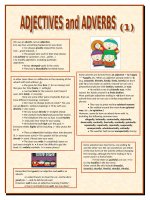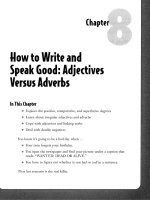ADJECTIVES AND ADVERBS
Bạn đang xem bản rút gọn của tài liệu. Xem và tải ngay bản đầy đủ của tài liệu tại đây (149.5 KB, 14 trang )
ADJECTIVES & ADVERBS
RULES TO FOLLOW
ADJECTIVES
• Modifies Nouns
• Modifies Pronouns
DEFINITION OF AN
ADJECTIVE:
• It tells what kind of person, place, or thing.
A noun or a pronoun is.
• It may also point out which one or how
many.
EXAMPLES:
• The ship was an English vessel. (what
kind)
• This factory is mine. (which one)
• Many people enjoy the annual dinner.
(how many, which one)
AN ADVERB:
• Modifies an active verb or a verb phrase by
expressing manner, place, time, degree, or
number.
TYPES OF ADVERBS:
• Simple
• Interrogative
• Negative
EXAMPLES:
• SIMPLE:
– She moved quietly. (Manner and tell how)
– I waited there for an hour. (Place and tell
where)
– You may leave soon. (Time, tells when)
– I called you once. (Number, tells how many)
– He sat very still. (Degree, tells how much)
Interrogative Adverb
• Introduces a sentence that asks a question
• where, when, why and how
EXAMPLES:
• Interrogative:
– When will you return?
– How is the trunk being sent?
Negative Adverb
• Denies or contradicts a statement
• no, not , never, only, scarcely and hardly
Note: two negative adverbs should not be
used together.
EXAMPLES:
• Negative
• - I can scarcely believe my eyes. ( correct)
• - I haven’t no more sea shells. (incorrect)
Familiar Adverbs
to Know
• almost
finally
seldom
unusually
certainly hardly
quite so usually just rather
very rather fairly nearly too
scarcely well
This powerpoint was kindly donated to
www.worldofteaching.com
is home to over a
thousand powerpoints submitted by teachers. This is a
completely free site and requires no registration. Please
visit and I hope it will help in your teaching.









